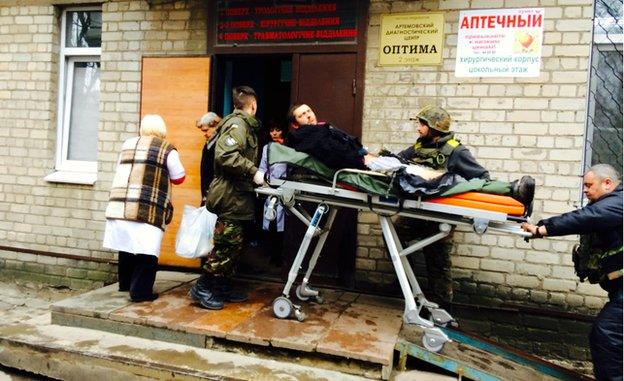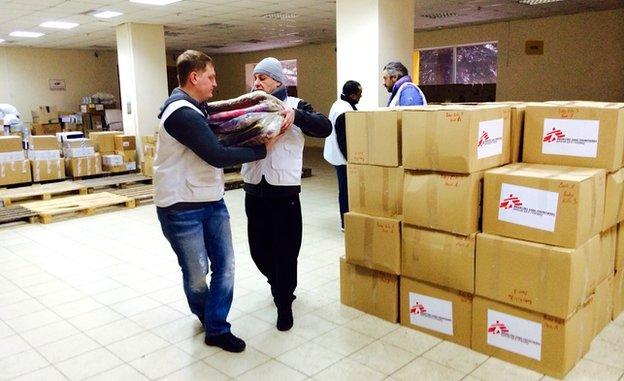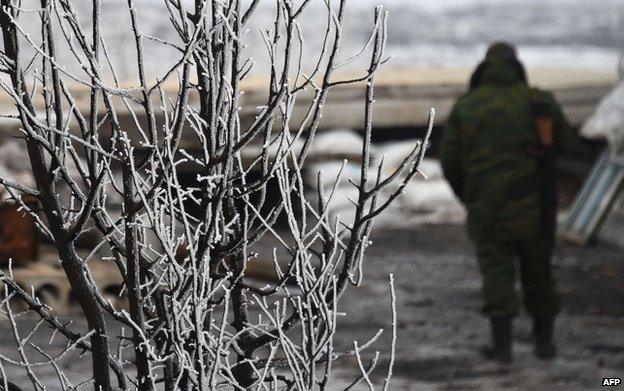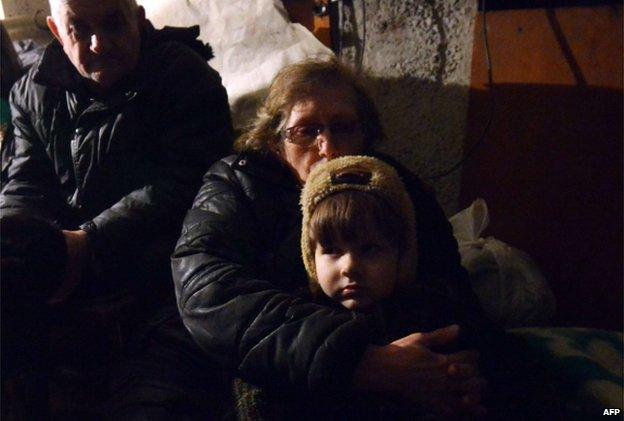Ukraine civilians stranded as shells pound Debaltseve
- Published
Many Ukrainian soldiers are returning injured from the frontline, as Sarah Rainsford reports
For several days, the casualties have been pouring into Artemivsk hospital from the latest major battle in the Ukrainian conflict.
They are rushed in by ambulance, some on stretchers and some walking wounded; all were injured in the fight for Debaltseve, the nearby town that separatist rebels have vowed to encircle and seize.
"They are shooting all day long, from Grads [rockets] or whatever they have," says Alexander Verushkin, a wounded conscript soldier who describes fierce clashes over several days.
Ukrainian troops are firing back, though Alexander has seen signs that they are struggling.
"Give us the kit and we can win," he insists. But where he was deployed, all but one vehicle was off the road.

War wounded arrive at Artemivsk hospital
"We need spare parts. Everything's broken," he adds, lowering his head in pain from the shrapnel lodged in his arm.
The pro-Russian rebels don't appear to suffer the same supply problems.
Nato claims their new offensive comes after reinforcements of weapons and troops from Russia, though Moscow continues to deny that. Instead, Russia's President Vladimir Putin recently turned the tables on Ukraine, labelling it a "Nato Foreign Legion".
No solution
The strategic importance of Debaltseve is clear when looking at a map of the front line. It falls within a section of government-controlled territory that juts into the rebel-held area, and the separatists want to straighten the line.
It is a rail hub and has seen fierce fighting for several months, becoming like a new symbolic prize to win after Donetsk airport.

As the battle on the ground has intensified again, civilians have suffered too.
It took doctors four hours to remove all the shrapnel from 22-year-old Irina Ivanova, after a shell landed metres from her home. She had just returned to the east, to Svitlodarsk - close to Debaltseve - because there was supposed to be a ceasefire.
Irina is still too weak to talk much, but from beside her hospital bed, her father calls her survival a "miracle".
"I want to hope that the two sides can agree to end all this," Alexei Ivanov says, stroking his daughter's hand. Outside, there is the occasional dull thud of a shell in the distance. "They won't resolve this through fighting. War is no solution," Alexei adds.
'Hospitals targeted'
The escalating conflict has put medical facilities like this one under great strain.

Aid agency Medecins Sans Frontieres is struggling to deliver medical supplies to towns on the frontline
Demand on services has soared, supply lines have been disrupted and there are fewer doctors as many have fled, to safer ground.
The danger is real: a nurse was killed near Debaltseve this week when her clinic was hit by a shell.
"This is unacceptable, hospitals should not be targeted," says Andreas Koutepas, of the aid agency Medecins Sans Frontieres (MSF). It is delivering medical supplies where they are needed - kits for war injuries, and for regular illnesses too.

Pro-Russian soldiers have been trying to encircle government troops in Debaltseve
But the scale of fighting recently has made it impossible to reach towns along the front line - the ones most in need of support.
"We can't get there because of insecurity," Mr Koutepas explains. "We are very worried. We know people there have zero access to health care, and they can't get out right now."
Trapped
In other areas, the renewed fighting has already created a new wave of refugees. The number of people seeking help is climbing as people flee, fearing the front line is about to move again.

People are forced to hide in a shelter during shelling near Debaltseve
The local authorities have begun to evacuate people from in and around Debaltseve, but many remain trapped.
"My mother is in the basement all the time," says Marina Kiptilova, who left her village outside Debaltseve some months back. Marina's mother stayed on, but now she is terrified.
"She says she can't take it any more, the constant shelling. She wants to hang herself or swallow some pills," Marina says, and adds that food is now running out.
"It's scary. Her nerves can't stand it," she tells me.
As Ukraine's war rages once again, her town has become a key battle ground.
Government troops insist they will hold the line and halt any rebel advance on Debaltseve. But the cost to soldiers, and civilians, is mounting.